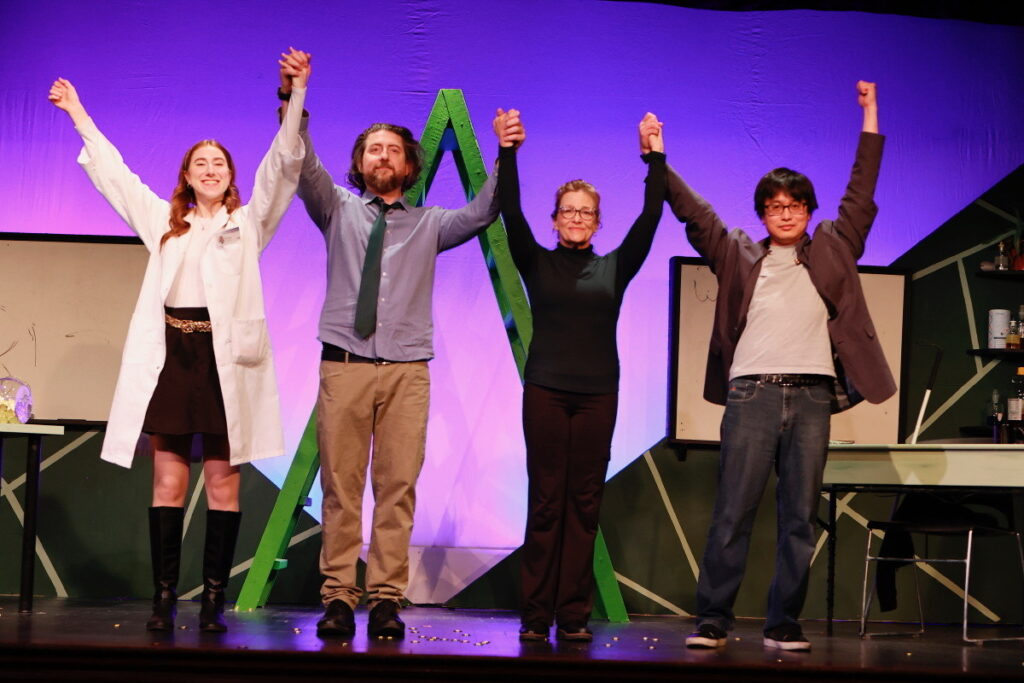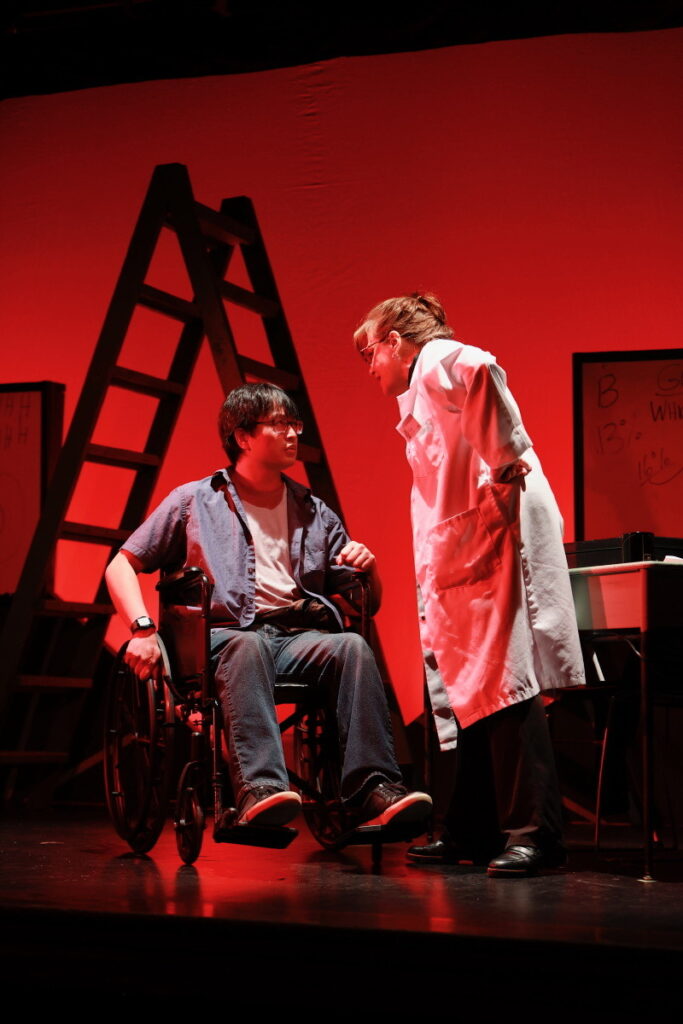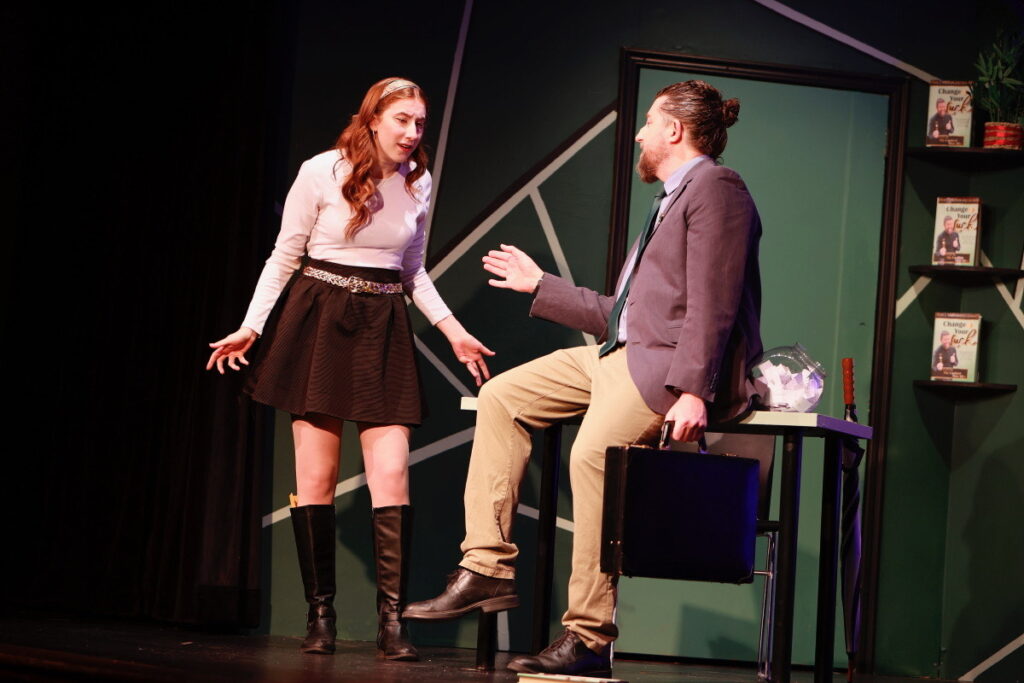REVIEW: Sequence is a clever, challenging piece of theatre

Village Theatre Waterdown’s closing production of the season merges two parallel narratives in a fast-paced, well-acted production.
The closing production of Village Theatre Waterdown’s season is Sequence, a cerebral and mysterious show that will have synapses firing as big ideas and barbs fly.
Sequence is an award-winning play that was first workshopped in 2011 and had its world premiere in Calgary in 2013. It has been the recipient of the Betty Mitchell Award, the Calgary Theatre Critics Award, the Woodward Newman Drama Prize, the Gwen Pharis Ringwood Award for Drama, and the Alberta Playwriting Competition Grand Prize. Its playwright, Calgary’s Arun Lakra, is also a film writer, musician, public speaker, and eye surgeon.
Sequence is structured as two parallel narratives that begin to intertwine both conceptually and physically. In one, Theo is introduced as a successful self-help guru and writer who has been dubbed the "luckiest man alive." He’s made a fortune by successfully predicting the result of the Super Bowl coin toss for 20 years running. After one of his speaking engagements promoting his book, he’s confronted by an irate young woman, Cynthia, who claims that he’s a fraud. Meanwhile, stem-cell researcher and rather tyrannical professor, Dr. Guzman has summoned a student, Mr. Adamson, to her office. He has done the impossible: scored all 150 multiple-choice questions wrong on Guzman’s genetics exam, which defies probability. She has her own small set of hypotheses, but demands to know how Adamson did it.
Sequence is a fast-paced, two-act play that places the parallel stories on a collision course of ideas and coincidences that gradually merge together. It was staged by Tarragon Theatre in Toronto back in 2017. The Toronto Star had this to say: “If you like brainy plays that challenge you to keep up and give you lots to pick apart afterwards, grab some clever friends and get along to this one.”
Indeed, Sequence is clever, challenging, even confusing at times; it takes on profound concepts like luck, destiny, science, God, chaos, faith, and life itself. Throughout, there’s an undeniable current of energy that draws the audience’s attention to the stage. There's a staccato beat to the dialogue and the cast shows considerable skill and confidence in the way they deliver their lines without faltering.

Christine Hopkins’s performance particularly stands out for me as the acerbic, no-nonsense Dr. Guzman. The speed and confidence of Guzman’s rapid-fire wit as well as the actor’s comedic timing was impressive. The audience audibly reacted to a few of the biting remarks she levelled at Mr. Adamson’s expense. The authoritative snap of her retorts as a self-assured professor was, let’s just say, familiar.
For his part, I was impressed at how skilfully and smoothly Jeff Nguyen (the aforementioned Mr. Adamson) navigated the stage in his wheelchair, often at tight quarters and around tables. Until he stood at the end of the play to receive applause, it was nearly impossible to tell that he didn’t normally use a wheelchair.
Adam Fleming brings considerable charisma as well as a suitable level of arrogance and salesmanship to his portrayal of Theo, the “world’s luckiest man.” His verbal sparring partner, Cynthia (Theresa Walsh), is a forceful presence whose anger and motivations become known as the play unfolds.
During the play, numerous "coincidences" are identified and debated as to their mathematical probability or predestination. Yet another emerged in the audience for my friend and theatre companion, Melissa. Ten years ago, Fleming (who is a doctor in his time offstage), provided some memorable and supportive counsel to Melissa when her child was in hospital.
One of the most obvious strengths of Village Theatre’s Sequence is its complex use of the stage and the choreography of movement between the actors as the play rises to a crescendo in Act 2. In the early stages of the play, the action of the two pairs, Theo and Cynthia and Dr. Guzman and Mr. Adamson is sharply separated, existing only within one-half of the stage. The stage is cleverly marked at its midway point by a tall, standing ladder. As the story evolves, the pairs start to breach the other side of the stage until at last the four actors are moving around the entire space – and each other – as though in an intricate dance.
Uniquely, if there is a moral to the story of Sequence, it is not so obvious. Many plays telegraph their messages, but Sequence never answers definitively whether good fortune is the territory of knowable, predictable science, divine destiny or random chance. Sequence’s last moments are literally shrouded in unexpected darkness. The play leaves unanswered questions for audience members to ponder as they trail out of the theatre and make their way home. This was certainly happening around us as Melissa and I made our way back to the car and our own conversation.
Congratulations to director Francesca Brugnano, the cast and crew (including a community of about three dozen volunteers), on this thought-provoking, philosophical and energetic show.
As an audience advisory, Sequence contains some mature language and subject matter.
NEED TO KNOW
Sequence continues May 8, 9 & 10, 8 p.m. and May 8, 2 p.m.
Memorial Hall, Village Theatre Waterdown
317 Dundas St. E. (Hwy 5), Waterdown
Tickets here
(905) 681-6000
















